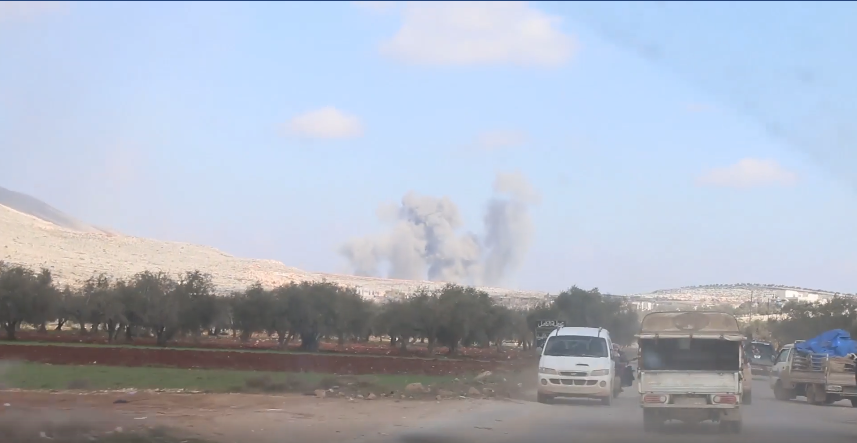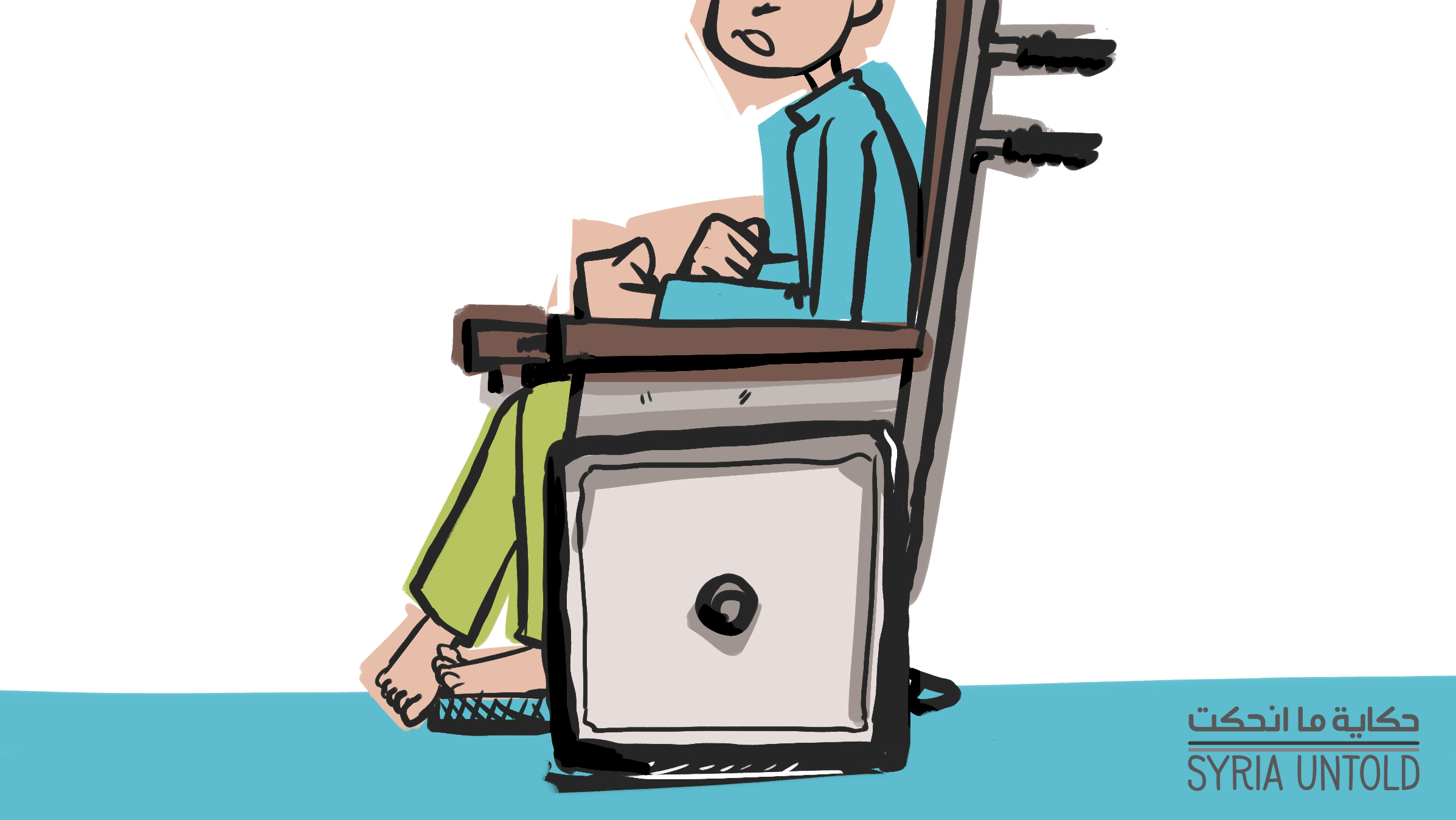Mustafa Qalaaji queues up for a humanitarian aid basket in the town of Kafr Takharim, in the northern Idlib countryside. Provided to displaced Syrians by the International Association for Relief and Development, the basket contains much-needed supplies including blankets, cleaning materials and sponges.
Qalaaji, 47, is originally from the southern countryside of Idlib. He used to work in construction before he was displaced here, to Kafr Takharim, settling in an apartment without a roof that he hastily built as a shelter for his children.
But as soon as he receives his basket, Qalaaji sells it for around 25,000 Syrian pounds ($25) to a merchant waiting nearby. He prefers to buy food with that money rather than take the basket items themselves home.
“I moved to Kafr Takharim five months ago, and I have so far only received one financial aid basket—even though I’ve been unemployed ever since I was displaced, and haven’t been unable to provide for my children,” he tells SyriaUntold. “Prices are skyrocketing due to the increase in the price of the dollar.”
“I brought my home furniture…so I had to sell them at a low price to be able to buy food and heating materials to cope with the harsh winter conditions. Also, the price of a bag of bread has exceeded 400 pounds.”

‘We buy and sell aid’
In Syria’s northwest, humanitarian aid baskets—intended for those most in need—have turned into commodities. Sold off at low prices, these commodities now top the shopping lists of Idlib residents and displaced Syrians visiting the markets.
The displaced go to well-known merchants to sell their relief supplies, often at low prices amounting to just 30 percent of their original value. Traders take advantage of the fact that few people are willing to buy aid baskets at the original price.
Muhammad al-Ahmad, 30, was displaced from Kawkaba in the northern Hama countryside towards the border camps of Sarmada in northern Idlib. Before being displaced, Ahmad used to work in a food store in his village. He now lives in a tent close to the Syrian-Turkish border along with his wife and four children.
“Most humanitarian organisations distribute food baskets on a monthly basis, and there are families that can get up to two or three baskets a month. This forces many families to sell their food baskets in order to get money and maybe buy medicine, heating materials, clothes and cooking gas [with the money],” he tells SyriaUntold.
“We sell food baskets to any store that buys relief items in the area. The store, in turn, sells these to people at lower than market prices and turns over great profits,” he adds. “It’s become very commonplace.”
This isn’t a trade merely built off the racketeers. Some relief workers have even started moving into the food basket trade, with large networks of merchants recently spreading out into the markets. They strike the words “UNRWA,” “distributed free of charge” and “not for sale” from the packaging before putting them up for sale.
This is a relatively common sight in most of Syria’s provinces—even in hotspots where food is sold at staggeringly high prices.
Ayham al-Abdullah, 28, is a former university student from the southern countryside of Idlib. He works as a relief officer in the International Association for Relief and Development, which distributes food, hygiene baskets and meals to the displaced and in-need in Syria’s northwest.
“We warn the suppliers against buying the same materials from the displaced, as we would not accept any material previously handed over. We do not want to encourage the sale of humanitarian aid,” he explains to SyriaUntold.
“We are working hard to end this phenomenon by diversifying the aid and including heating materials, meals, hygiene baskets and household items such as blankets and mattresses—not to mention the small projects we provide…to allow [displaced and Idlib residents] to cover most of their needs and prevent them from selling their baskets.”
Abu Omar, a merchant who buys relief items from the displaced, tells SyriaUntold on condition of anonymity that “since most of the displaced want to sell the items they receive to get money, we are simply working to fulfil their needs.”
“Materials are bought according to their quality and demand, so saying there is a kind of exploitation isn’t realistic.”
“What we’re doing is trade, not theft,” he argues. "The goods we buy are put up for sale at reasonable prices that benefit both the poor and the people selling the relief items.”

Attempts to curb the trade
Shops selling humanitarian aid are widespread in Idlib city as well as the border camps around Sarmada, Dana, Deir Hassan and Atmeh. Merchants place signs at the door of their store reading, “We buy and sell relief goods.”
A large portion of people who do not receive humanitarian aid go to these shops to buy the goods at low prices.
Jamil Abu Muhammad, 51, fled his home in the Sahel al-Ghab region to Deir Hassan along the Syrian-Turkish border. Since arriving there, he’s opened a shop to meet the demand for aid in the camps.
“Selling humanitarian aid has become a source of income for a large portion of displaced people in the camps,” Muhammad tells SyriaUntold. “Families that receive three food baskets per month sell two of them, or whatever items they don’t need…and keep the more important items such as sugar and rice.”
There have been some attempts to curb the trade. Humanitarian organisations have recently started handing out food cards to displaced aid recipients to be used at a food store approved by the organisation itself. These cards range between $30 and $85, depending on the number of family members.
And yet still, the trade continues.
Murhaf Abu Abdullah, whose asked that his real name be withheld in this report, is a 33-year-old displaced Syrian from the northern Hama countryside. Now in northern Idlib, he receives a card worth $50 to buy food and cleaning materials. While the card he receives is renewable for a period of three months for the same monthly value, he sold it to a shop owner for $45 because he needed money.
“This month, I got a food basket but I didn’t need food. I needed heating materials, so getting money would help me fulfil those needs,” Abu Abdullah says. “Forcing the displaced to buy certain materials will only force them to sell these materials to buy other items they need.’
Another shopkeeper in northern Idlib tells SyriaUntold that “we secretly buy the cards for a sum of money without the knowledge of the [aid] organisation, and under the responsibility of the displaced person who wants to sell their card.”
“So this can’t be deemed exploitation,” he argues.
According to Jihad al-Omar, a 40-year-old relief officer with the Ihsan Relief and Development Organisation, his organisation has a system of checks to avoid this kind of thing happening.
Ihsan distributes food cards to the displaced in several areas in northern Syria.
“We choose the neediest families…and then we choose larger commercial stores that sell all the food and cleaning materials that we want to offer, so that the beneficiaries can choose the required materials,” he tells SyriaUntold by telephone.
“We [also] send committees to the shops and dispatch people who pretend they want to sell their cards in order to test the integrity of the shop owners. We have dismissed dozens of shops that buy food cards, and we stopped offering cards to the displaced who sell theirs.”

Projects for sale
The sale of humanitarian aid has not been limited to food baskets, hygiene baskets and food cards. There are even displaced people who sell on the small projects that they receive through humanitarian organisations. These include sewing projects, sweet shops, water purification shops and projects aimed at raising livestock—projects launched by charities and aid organisations in order to build resilience among displaced populations in northwestern Syria. The idea is to give people to chance to provide for themselves.
Muhammad al-Nasser, 35, is a veterinarian from Jabal al-Zawiyah and a project manager within the Support Aleppo campaign.
Support Aleppo offers projects, particularly those related to raising livestock and husbandry, to some of the poorest families in the region.
“We launched a project that consists of handing over livestock to 67 beneficiaries from poor families. The poorest receive a cow and we build a barn for them. We cover treatment and provide the fodder over the course of six months,” Nasser explains by telephone.
“Meanwhile, the beneficiaries pledge not to sell off the project, let alone the sheep and chicken.”
However, after the project began, Nasser remembers, the campaign was “surprised” to hear that at least 10 beneficiaries had sold on their stake in the project “under the pretext that they needed funds or because they had no one to run the project for them.”
“So we stopped providing fodder to these beneficiaries.”
Hanaa Al-Khaled, 48, was displaced from the southern countryside of Idlib to Idlib city. She lost her husband to pro-government bombing six years ago and received a tailoring project worth $800 from the Ihsan Relief and Development Organisation before her displacement. She received sewing machines, batteries and power boards. The organisation was to provide items worth 400 dollars some three months into the start of the project.
“I asked for this specific project because of my experience in sewing, and I received the needed equipment before I was displaced from the village. I started working and managed to earn approximately $50 per month, which helped me provide for my family,” Khaled tells SyriaUntold.
“But after my displacement to the city of Idlib, there was no longer any demand for embroidery.”
“The equipment became a burden for me because I no longer had any room for the equipment. So I sold it to a merchant in the city for $350,” she explains. “As a result, I lost the remaining amount I was supposed to get for the project.”
Displacements like these have only continued as pro-government forces backed by Russian airpower seized more opposition territory before a shaky ceasefire, brokered between Russia and Turkey last week, entered into force.
Humanitarian aid is in short supply, and humanitarian organisations have struggled to respond to the recent wave of displacement—the largest in the history of the Syrian conflict, according to UN estimates.
A version of this article was originally published in Arabic here.






